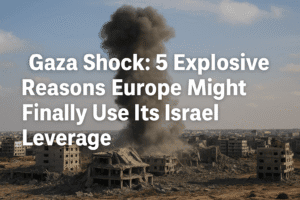Gaza Shock: 5 Explosive Reasons Europe Might Finally Use Its Israel Leverage
Decades of deep EU-Israel economic ties failed to translate into meaningful political influence for Europe, hampered by internal divisions and Israel’s perception of invulnerability bolstered by unwavering US support. However, the devastating scale of Gaza’s destruction and West Bank settler violence has triggered an unprecedented shift in European public opinion and political calculus. Mounting pressure, even within traditional allies like Germany, is pushing EU states beyond rhetoric towards tangible actions – including sanctions on settlers and a pivotal Dutch-led initiative, backed by 17 members, reviewing Israel’s compliance with the human rights clause in their core trade agreement.
While suspending the entire pact requires unlikely unanimity, Europe holds significant asymmetric leverage: it can inflict real economic pain by suspending tariff-free access, research funds, or visa-free travel, tools previously withheld. This potential use of economic muscle represents a fundamental challenge to Israel’s long-standing assumption of unconditional European support. The EU now faces a critical test of its unity and commitment to its foundational values, with its global credibility at stake. Whether it follows through will determine if the erosion of trust becomes irreversible, finally demonstrating that ignoring European concerns carries a cost.’

Gaza Shock: 5 Explosive Reasons Europe Might Finally Use Its Israel Leverage
For decades, a paradox defined EU-Israel relations: deep economic integration coexisted with fragmented, often ineffective political influence. While Europe remained Israel’s indispensable neighbour – its largest trading partner, primary academic funder, and favourite travel destination – its political voice was consistently muted. Internal divisions, historical guilt binding nations like Germany, and the rise of nationalist allies like Hungary, rendered the EU a geopolitical whisper against the roar of US backing.
The Crumbling Pillars of Complacency:
Israel’s leadership, particularly under Netanyahu, operated with a perceived invulnerability regarding Europe. Condemnations of settlements or military actions were met with accusations of antisemitism or dismissed as irrelevant noise. As former EU policy chief Josep Borrell starkly observed, the lack of tangible consequences – like settlers freely exporting goods to Europe or traveling visa-free – stripped EU criticism of any teeth. Israel, it seemed, could rely on European economic ties regardless of political friction.
Gaza: The Catalyst for a Continental Reckoning:
The sheer scale of death and destruction in Gaza, coupled with escalating settler violence in the West Bank, has fundamentally altered this calculus. European public opinion has shifted dramatically. Polls show overwhelming majorities, even in traditionally staunch allies like Germany (75%), demanding concrete action like arms embargoes. This public pressure is forcing governments to move beyond rhetoric.
From Words to Leverage: Testing Europe’s Resolve:
The shift is no longer theoretical. Concrete steps signal a new seriousness:
- Targeted Sanctions: Sanctions on extremist settlers and Israeli cabinet ministers (UK).
- Diplomatic Shifts: France flirting with unilateral Palestinian statehood recognition.
- The Nuclear Economic Option: The Dutch-led call, backed by an unexpectedly large coalition of 17 member states, to review Israel’s compliance with the human rights clause (Article 2) in the foundational EU-Israel Association Agreement.
This review is pivotal. The EU’s foreign service has already found “indications” of violations. While suspending the entire agreement requires impossible unanimity, qualified majority voting could cripple key benefits:
- Suspending Tariff-Free Access: Hitting Israel’s export-dependent economy where it hurts.
- Halting Horizon Research Funding: Cutting off vital academic and scientific collaboration.
- Ending Visa-Free Travel: A deeply unpopular move directly impacting Israeli citizens.
The Stark Reality of Leverage:
The trade imbalance is crucial. While Israel is vital for Europe in niche sectors (cyber, advanced weapons), the EU is Israel’s economic lifeline. Israel ranks only 31st in EU trade partners, behind Morocco and Algeria. Europe has far more capacity to inflict economic pain than it would suffer in return.
Beyond Economics: The Battle for Europe’s Soul:
As Borrell warns, the EU’s greatest power lies in being a “community of values.” Continued inaction in the face of alleged severe human rights violations erodes that foundational identity. The inconsistency between professed values and tangible policy undermines the EU’s global credibility and moral authority.
A Tipping Point, Not a Guarantee:
Significant hurdles remain:
- Commission Hesitancy: Ursula von der Leyen controls the agenda. While critical of Gaza, she hasn’t embraced sanctions.
- Vested Interests: Historical ties and specific national interests (defense, energy) still exert pull.
- The US Factor: America’s unwavering support provides Israel a powerful counterbalance.
The Human Insight: Why This Time Feels Different
This isn’t just another diplomatic spat. It represents a profound shift driven by:
- Unprecedented Public Revulsion: The scale of suffering in Gaza, broadcast globally, has penetrated European consciousness like never before, creating bottom-up pressure.
- Strategic Patience Wearing Thin: Years of Israeli dismissiveness towards EU concerns have fostered a critical mass of frustration among member states, overcoming traditional divisions.
- Israel’s Own Vulnerability: Growing domestic protests within Israel against the war’s conduct suggest even Israeli society fears pariah status. European actions could amplify this internal pressure.
Conclusion: The End of Taking Europe for Granted?
Europe is finally, haltingly, reaching for the tools of leverage it long possessed but refused to wield. The outcome of the Article 2 review and subsequent votes will be decisive. If Europe follows through with tangible economic consequences, it would mark the end of an era where Israel could bank on unconditional European support regardless of policy. It signals that the political cost of the Gaza conflict, and the ongoing occupation, is no longer containable within the comfortable confines of the transatlantic relationship alone.
The question is no longer if Europe has leverage, but whether it possesses the collective will to use it – a test of its values, unity, and relevance on the global stage. The erosion of trust may already be irreversible.
You must be logged in to post a comment.